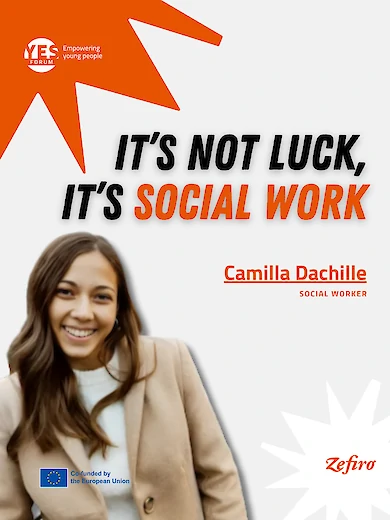It is difficult for me to find the right words to explain what motivates me to do this job; it’s mainly about feelings, such as the sense of wellbeing and usefulness I get from being in contact with young people. It’s a very dynamic job, where relationships and authenticity are at the center, and no day is ever the same as the previous one; it is therefore quite unpredictable and allows me to unleash my creativity.
In addition, I am a psychologist, and while working privately I realized that I felt somewhat “isolated” from society. That is why I decided to integrate my work with social work: it allows me to stay anchored in the daily reality of today’s youth, to immerse myself in it completely, so that I can better understand its dynamics and be of greater help.
A significant moment for me was when I felt that maybe what we do contributed to a boy’s growth: after a year with us, I heard him talk about himself in a completely different way than before. It was in 2023, the vocational training course where I am a tutor had started a few months earlier, and the students were asked to write on a sheet how they imagined themselves in the future. The boy let me read his paper, and the words written were: “Dead or in prison.” We started talking about his story, he believed that if he continued with this lifestyle, this would be his end in the medium term.
The following years weren’t easy: he had several crises, moments when he wanted to give up everything and fall back into deviant and dysfunctional ways of living. At the same time, however, I began to see a new trust and hope in him, as if the small achievements made during the course and the feeling of not being so alone anymore were helping him to move forward with courage.
A few days ago, this boy left for an internship in Germany, happy and smiling. I realized how important it is not to feel abandoned, to have a context and someone who believes in you and your potential.
I believe a widespread misconception is that anyone can work in the social field and that no particular skills are needed, just goodwill and patience. I also think that there are often prejudices suggesting that this work is not useful because, when faced with “lost causes,” there is nothing to be done. At the same time, another common belief is that the only way to deal with deviant youth is through harsh and punitive methods.
I wish more people realized how difficult this job is and how many skills it actually requires, as well as the frustration that often comes with facing failure or lack of change. But I also wish they could see the satisfaction and joy that comes when a young person, who had once been written off, blooms again, finds their own path, and regains trust in the world and in themselves.

